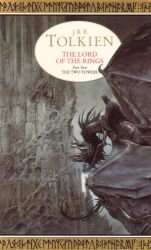This week we ease back into the Lord of the Rings re-read with the first chapter of The Two Towers, “The Departure of Boromir.” Spoilers for the whole book and comments after the jump.
What Happens
Aragorn goes to the top of Amon Hen, but sees only an eagle. He hears Orcs and Boromir’s horn, and arrives to find Boromir propped against a tree, full of arrows, with dead Orcs all around him. Boromir tells him that he tried to take the Ring from Frodo and is sorry, says that the Orcs took the Halflings, and asks Aragorn to save his people. Aragorn tells him that Minas Tirith shall not fall and to be at peace. Boromir smiles and dies.
Legolas and Gimli arrive. As they search the Orcs, they find two of the hobbits’ long knives, and note that some of the Orcs are from the Misty Mountains in the north, and some are of a kind strange to Aragorn, apparently in the service of Saruman. They cast Boromir loose in a boat and he vanishes over the falls. Aragorn and Legolas sing a song about those in Minas Tirith asking the winds for news of Boromir.
Back on the shore, Aragorn examines the ground and concludes that Frodo and Sam have gone to Mordor. Aragorn decides to follow the Orcs rather than abandon Merry and Pippin, and they begin the chase.
Comments
Wow, the “one book with three sets of covers” nature of LotR is really apparent in the very first sentence of this book: “Aragorn sped on up the hill.” Even the verb indicates continuing action.
(I checked one of our three-volume editions, which does have a short synopsis at the front; does anyone know if these are Tolkien-generated or not? I didn’t check the other three-volume edition, because it was on a high shelf and I didn’t want to bother.)
This is otherwise a fairly quiet chapter, very transitional, away from the Frodo-centric Fellowship, both in terms of the characters’ goals and the prevailing point-of-view character, and into the wider strategic view of Aragorn and his point of view. (We may have had a short section or two from his point of view before, but nothing this extensive.)
The other thing about the opening of this chapter is how very much not interested it is in combat. We hear some of the battle, and get a sense of its progress through Boromir’s horn calls, but we don’t see a single bit of it. Far, far more time is devoted to the aftermath, particularly Boromir’s funeral.
* * *
As far as Boromir’s funeral, well, I’m really coming to think that LotR would work better for me as a novel if it went about characterization more explicitly. As we’ve talked about at length here, readers often have to infer quite a bit about characters’ personalities and motivations—sometimes from backstory that isn’t even given for hundreds of pages. So even paying close attention to Boromir, this re-read, I could not feel as warmly about him or as sad at his death as his companions did. Which is a shame.
(Also, I have the feeling that the funeral is evoking some specific cultural references that I don’t share.)
* * *
A few miscellaneous comments:
The opening again mentions an eagle. The text is putting little “this is important” markers around that eagle much more than I remembered, to support Gandalf’s eventual return.
The text says of Aragorn, “The last words of Boromir he long kept secret.” If we’re going to go with the “Frodo wrote this” framing device, the whole opening of this chapter is therefore a problem: we’d have to say that it was added by a subsequent scribe, maybe the one in Gondor? I wonder if Aragorn told someone for independent reasons, or to make a complete record when he heard about/read/saw this text?
(Or you could be like me and pretend the framing device isn’t there except when you can’t ignore it.)
Finally, the end of this chapter felt again very transitional, like we were leaving these characters, so I was a bit surprised to see that the next chapter is still Aragorn and co.: “Dusk came. They passed away, grey shadows in a stony land.”
And that’s it! A more substantive chapter next time, I think.










